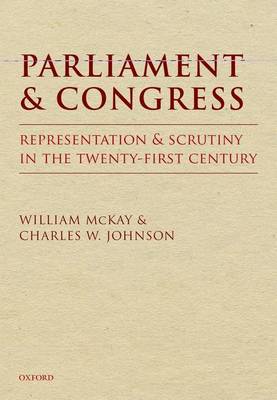
- Afhalen na 1 uur in een winkel met voorraad
- Gratis thuislevering in België vanaf € 30
- Ruim aanbod met 7 miljoen producten
- Afhalen na 1 uur in een winkel met voorraad
- Gratis thuislevering in België vanaf € 30
- Ruim aanbod met 7 miljoen producten
Zoeken
Parliament and Congress
Representation and Scrutiny in the Twenty-First Century
William McKay, Charles W Johnson
Paperback | Engels
€ 77,45
+ 154 punten
Uitvoering
Omschrijving
The constitutional background of both legislatures and their procedures are described and where possible compared. Currently unsolved problems often have much in common, in vexed areas such as ethics requirements or how procedural rules permit minorities fair access to legislative time before majorities prevail. British successes include the enhanced authority and effectiveness of select committees and the acquisition of more debating time by the creation of a parallel Chamber. Unsolved problems at Westminster begin with the powers and status of the Lords, and go on through the search for more effective review of EU activities, adapting parliamentary scrutiny to more sophisticated government financial information, and making better use of legislative time without diminishing back-bench rights.
The accelerated pace and extent of procedural changes in Congress is problematic. Constant pursuit of campaign funds, increased party exploitation of Members' ethical shortcomings, and partisan reapportionments, have diminished collegiality and compromise. Business is conducted with greater predictability, with fewer quorum calls, postponement and clustering of votes, and by utilization of ad hoc special orders, often in derogation of openness and minority rights in the House. Minority complaints have been frequent and occasionally extreme. Conversely constant filibuster threats in the Senate have enhanced minority party power there. An 'inverse ratio' between the greater complexity, importance, and urgency of pending legislation on the one hand, and diminution of deliberative capacity, fairness. and transparency on the other, has been repeatedly demonstrated, especially at the stage of final compromises between the Houses.
The accelerated pace and extent of procedural changes in Congress is problematic. Constant pursuit of campaign funds, increased party exploitation of Members' ethical shortcomings, and partisan reapportionments, have diminished collegiality and compromise. Business is conducted with greater predictability, with fewer quorum calls, postponement and clustering of votes, and by utilization of ad hoc special orders, often in derogation of openness and minority rights in the House. Minority complaints have been frequent and occasionally extreme. Conversely constant filibuster threats in the Senate have enhanced minority party power there. An 'inverse ratio' between the greater complexity, importance, and urgency of pending legislation on the one hand, and diminution of deliberative capacity, fairness. and transparency on the other, has been repeatedly demonstrated, especially at the stage of final compromises between the Houses.
Specificaties
Betrokkenen
- Auteur(s):
- Uitgeverij:
Inhoud
- Aantal bladzijden:
- 600
- Taal:
- Engels
Eigenschappen
- Productcode (EAN):
- 9780199655953
- Verschijningsdatum:
- 25/10/2012
- Uitvoering:
- Paperback
- Formaat:
- Trade paperback (VS)
- Afmetingen:
- 244 mm x 170 mm
- Gewicht:
- 1026 g

Alleen bij Standaard Boekhandel
+ 154 punten op je klantenkaart van Standaard Boekhandel
Beoordelingen
We publiceren alleen reviews die voldoen aan de voorwaarden voor reviews. Bekijk onze voorwaarden voor reviews.











